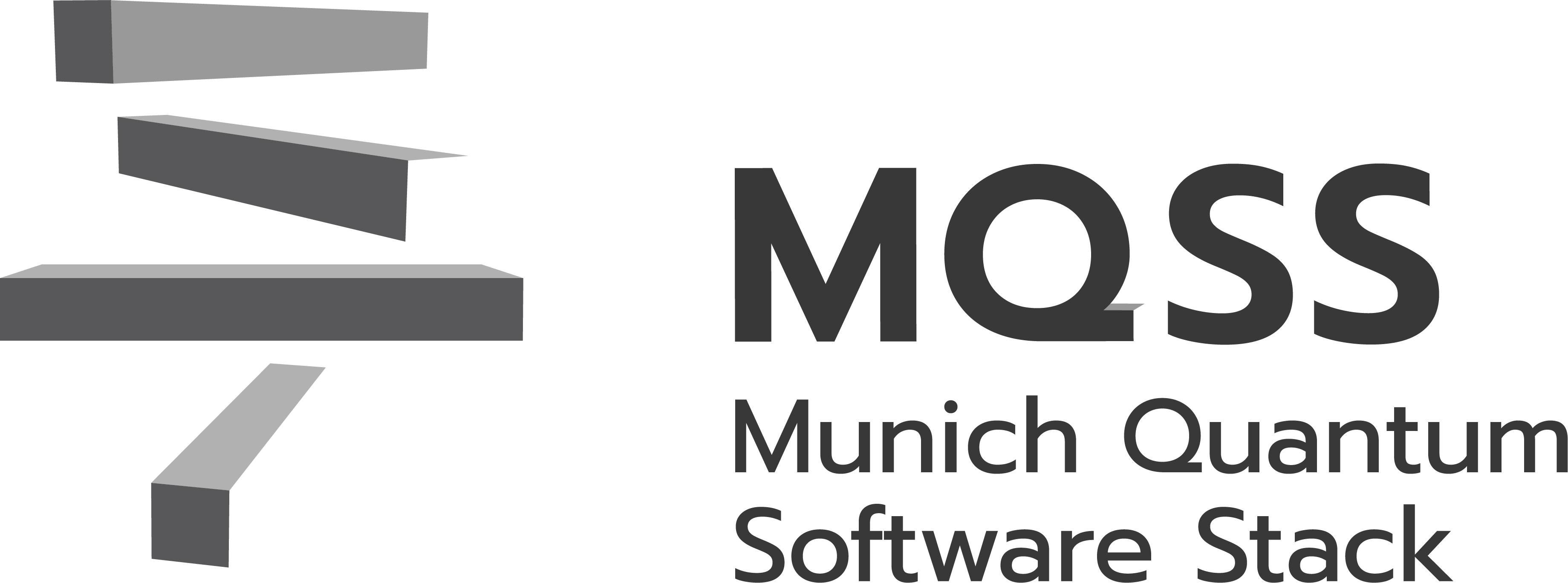
The Munich Quantum Software Stack (MQSS)
In order to make quantum computing accessible to a wide range of users from different backgrounds and fields, a comprehensive and unified software stack is needed. Such a software stack should be generic and flexible: It should be able to target multiple and different hardware platforms, and support all kinds of potential quantum algorithms, including future algorithms that do not yet exist. New requirements need to be addressed, such as dynamic compilation that takes into account up-to-date calibration data from the individual hardware systems. To enable users unfamiliar with quantum physics to use quantum computing resources, programming at a high level of abstraction must be sufficient to run their applications. In general, methods and tools are needed to automate the workflow from user to backend execution.
Of particular importance is the deep integration of quantum software with existing software stacks for classical high-performance computing (HPC). This is because quantum computing systems are expected to be used not only as stand-alone computers, but even more so as HPC accelerators, that is, quantum systems are suitable for accelerating very targeted problems, while the remaining computation requires classical HPC systems.

Within the Munich Quantum Valley (as part of the Q-DESSI consortium), we are developing the Munich Quantum Software Stack (MQSS) that takes all these requirements into account. The MQSS is jointly developed by the Leibniz Supercomputing Centre (LRZ) and th Chair for Design Automatio (CDA) as well as the Chair of Computer Architecture and Parallel Systems (CAPS) at the Technical University of Munich (TUM). A concrete instance of the MQSS is currently deployed at the LRZ; serving as a single access point to all of its quantum devices via multiple compatible access paths, including a web portal, command line access via web credentials, as well as the option for hybrid access with tight integration with LRZ's HPC systems. It facilitates the connection between end- users and quantum computing platforms by its integration within HPC infrastructures, such as those found at the LRZ. Apart from the close exchange with other MQV consortia, the scientists actively participate in other federally- and EU- funded projects. If you are interested in learning more or want to contribute, get in touch with us at mqss(at)munich-quantum-valley.com.
Quantum Device Management Interface (QDMI)
The Quantum Device Management Interface (QDMI) is one of the core components of the Munich Quantum Software Stack (MQSS) – a sophisticated software stack for connecting end-users to the wide range of possible quantum devices. It enables the submission and control of gate-based quantum systems, and enables software tools to automatically retrieve and adapt to the changing physical properties and constraints of different platforms. QDMI aims to bring together software and hardware developers, mediating between their competing interests, bridging between technologies, and ultimately providing appropriate trade-offs and constraints to be considered. QDMI is therefore the method of choice for integrating new platforms into the MQSS and for software tools to query information from these platforms. QDMI is provided as a collection of C header files to allow rapid integration into an HPC environment.
More Information
Official documentation
Source code on GitHub
Flyer introducing QDMI

Munich Quantum Toolkit (MQT)
The Munich Quantum Toolkit (MQT) is a collection of software tools for quantum computing which explicitly utilizes design automation expertise to provide efficient and automated solutions for design tasks across the entire quantum software stack. This entails high-level support for end users in realizing their applications, efficient methods for the classical simulation, compilation, and verification of quantum circuits, tools for quantum error correction, support for physical design, and more. These methods are supported by corresponding data structures (such as decision diagrams, tensor networks, or the ZX-calculus) and core methods (such as SAT solving). All of the developed tools are available as open-source implementations hosted on GitHub. Many of them are/will be integrated as part of the MQSS.
More information
Related projects and activities
Quantum Integration Centre
The Quantum Integration Centre (QIC) bundles the quantum activities at the Leibniz Supercomputing Centre (LRZ) and supports Munich Quantum Valley and its partners. It aims to realize an interface to the users of Bavarian quantum computers and to drive the integration of quantum computing with supercomputing and high performance computing forward.
Links
Q-Exa
Q-Exa, a hybrid, operational HPC-QC system, is the result of the project "Quantum Computer Extension for Exascale HPC" (Q-Exa). The aim of the project was to connect quantum processing units (QPU) based on superconducting circuits to a supercomputer and to develop interfaces and control tools for this purpose. Through innovative co-design and cooperation between science and industry, science and research should gain access as quickly as possible to a promising future technology that enables new computing methods. Q-Exa lays the foundations for researching and further developing quantum computing and for accelerating HPC through QPUs.
Links
quantentechnologien.de [German]
Euro-Q-Exa
The aim of the research project "European Quantum Computing for Exascale HPC" (Euro-Q-Exa) is to integrate quantum computers into an existing supercomputer and into High Performance Computing (HPC) at the Leibniz Supercomputing Centre (LRZ). In addition to hosting the system at the LRZ via efficient operational support, software and hardware solutions are to be developed for the integration of the Euro-Q-Exa system series into the HPC infrastructure at the LRZ.
Links
quantentechnologien.de [German]
Q-DESSI
The Quantum Development Environment, System Software & Integration (Q-DESSI) consortium is dedicated to the creation of a Munich Quantum Software Stack, a technology-independent software environment enabling both quantum and hybrid applications. It includes programming and runtime environments with optimized compilers, runtime systems and tools, the system software needed to control, access and operate quantum systems and the software to integrate them into existing computing structures as part of the larger high-performance computing (HPC) ecosystem. The work inside the Q-DESSI consortium builds on the hardware work in the technology consortia within the MQV and partner projects, provides the necessary cross-technology abstraction layer as well as services to the application and library layers to the user community.
